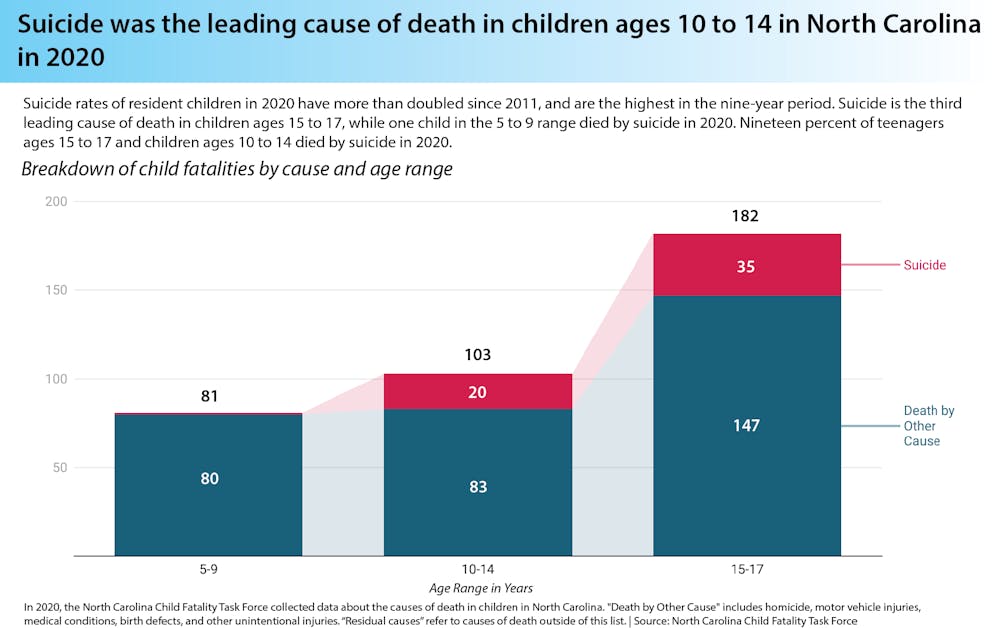The findings also showed that 18 percent of high schoolers made a plan for a suicide attempt and 22 percent seriously considered attempting suicide. Among students who identify as gay, lesbian or bisexual, 48 percent seriously considered suicide, 36 percent made a plan for a suicide attempt and 21 percent attempted suicide within the 12 months prior to being surveyed.
According to the plan document, focus areas for prevention include creating coordinated infrastructure, reducing access to lethal means, increasing community awareness of suicide risk, identifying at-risk populations, providing crisis intervention as well as suicide care and ultimately measuring the impact of these strategies based on results.
Reducing youth access to lethal means is something Kristiansen is working to implement in her work both on the task force and as director of social services for Chatham County.
Educational initiatives for the safe storage of potentially lethal items, including Counseling on Access to Lethal Means trainings and the creation of Firearm Safety Teams, are part of the plan's efforts to reduce access to life-ending measures. Though not all counties in North Carolina have Firearm Safety Teams, some, like Chatham County, are looking to adopt programs similar to the Gun Safety Program in Durham County.
“Safe storage is definitely something that we are talking with parents about,” Kristiansen said.
As both a member of the task force and a child welfare service provider in Chatham County, Kristiansen said she is working toward creating prevention policies on both a local and state-wide level.
“Something I’ve noticed working on a local level is that we may see issues pop up in our community, but we don’t always know how it’s affecting other communities in North Carolina,” Kristiansen said.
Alongside emphasizing safe storage, the task force has recommended the creation of a state suicide prevention coordinator role and increased in-school suicide prevention training.
Christian Fisher, a Pittsboro-based psychotherapist who works with adolescents, echoed the need for more adolescents to connect with systems of support, like in-school counseling and the new 988 crisis line.
“I would definitely encourage teenagers to connect with their school social workers or guidance counselors and get linked up for support,” Fisher said.
The UNC Suicide Prevention Institute is a new initiative created through a $25 million gift from William and Dana Starling, who lost both of their sons to suicide. The institute is housed within the UNC Health System and is led by Dr. Patrick Sullivan and Dr. Samantha-Meltzer Brody.
“We’re trying to do school-based interventions to strengthen mental health among kids, and we’re trying to figure out how to better treat kids in primary care and pediatrics,” Sullivan said.
To get the day's news and headlines in your inbox each morning, sign up for our email newsletters.
Though the institute has only existed for six months, it is currently working to organize suicide prevention initiatives locally before moving onto larger-scale projects, according to Sullivan.
Outside of the institute, Sullivan studies the molecular genetics of psychiatric disorders and instances of suicide.
“I think that even if the overall numbers are bad, there’s certain segments of the population for whom it’s actually worse,” Sullivan said. “For example, LGBT people and Black youth are in a particular crisis as well.”
For Sullivan, promoting a dialogue about suicide and raising awareness about community resources for those who might be struggling is integral to suicide prevention.
"It really needs to be something where we take every effort to get the message out there, and sometimes people need to hear a message twice before it sinks in," Sullivan said.
Mental health resources
If you or someone you know is thinking about suicide, the National Suicide Prevention Lifeline, 988, is available 24/7. It is free and confidential.
UNC students who need assistance during this time may contact Counseling and Psychological Services, the Office of the Dean of Students or Student Wellness. CAPS can be reached 24/7 by phone at 919-966-3658. University employees can reach out to the Employee Assistance Program.
Additional University support resources are available via Heels Care and the Multicultural Health Program.
Peer supporters from student-run organization Peer2Peer, which offers mental health resources for graduate and undergraduate students, can be reached through their online form. Students can remain anonymous.
For support in Orange County, visit the National Alliance on Mental Illness website.
@wslivingston_
@DTHCityState | city@dailytarheel.com
Walker LivingstonWalker Livingston is the 2024 enterprise managing editor at The Daily Tar Heel. She has previously served as summer city & state editor and assistant city & state editor. Walker is a sophomore pursuing a double major in journalism and media and American studies, with a minor in data science.



